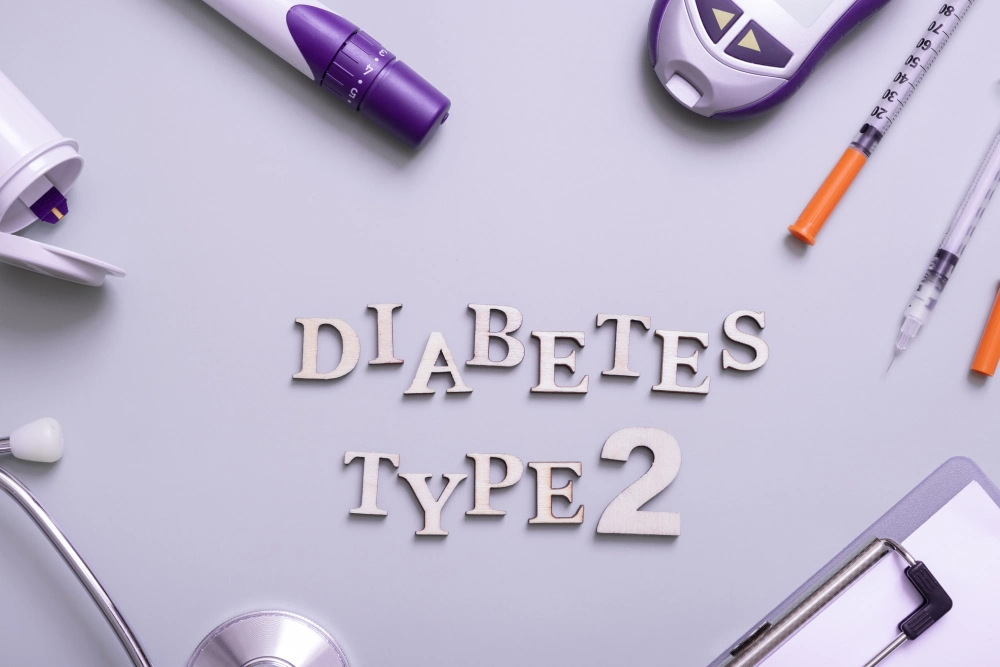Type 2 Diabetes in Kenya
Type 2 diabetes occurs when your body cannot produce enough of a hormone called insulin, or when the insulin it makes doesn’t work properly—this is called insulin resistance. Insulin helps regulate blood sugar levels, and without it functioning correctly, blood sugar levels become too high.
In Kenya, type 2 diabetes is becoming more common, especially in urban areas where processed foods and sedentary lifestyles are increasing. Type 2 diabetes in Kenya affects people of all ages, but it’s more prevalent in adults over 25, particularly those with a family history of the condition. High blood sugar levels over time can lead to serious health problems, including heart attacks, strokes, and complications with your eyes, kidneys, and feet.

Managing Type 2 Diabetes
Living with type 2 diabetes requires ongoing management to prevent complications. Treatment includes regular health checks, support for maintaining a healthy weight, staying active, and eating a balanced diet. You may also need to take medication, including insulin, and check your blood sugar levels regularly.
In Kenya, access to healthcare services is essential for managing type 2 diabetes effectively. Clinics and hospitals can provide the necessary support, medications, and lifestyle advice to help you manage the condition.
Risk Factors and Symptoms of Type 2 Diabetes
Although type 2 diabetes is often associated with being overweight or obese, it can affect anyone, regardless of their weight. In Kenya, other risk factors include ethnicity (with higher rates among South Asian and Indian communities) and family history.
Many people with type 2 diabetes may not experience symptoms right away, or their symptoms may be mild and go unnoticed. This means that type 2 diabetes can go undiagnosed for years. If left untreated, it can lead to serious complications.
Some common symptoms include:
- Increased thirst
- Frequent urination, especially at night
- Feeling tired all the time
- Unexplained weight loss
- Blurred vision
- Cuts or wounds that take longer to heal
If you notice any of these symptoms, it’s important to see a doctor for a diagnosis.
Preventing Type 2 Diabetes
The good news is that many people can take steps to prevent type 2 diabetes. By making healthy lifestyle changes such as eating well, staying active, and managing your weight, you can lower your risk. In Kenya, traditional foods like sukuma wiki and ndengu can be part of a healthy, balanced diet that helps prevent diabetes.
Maintaining an active lifestyle by walking, cycling, or playing sports can also help reduce your risk. It’s important to make these changes early, especially if you have a family history of diabetes or are in a higher-risk ethnic group.
Before you use the tool to find out your risk, you need to take a few measurements: your waist size, your height and your weight.
Remission of Type 2 Diabetes
Although there is no cure for type 2 diabetes, some people can put their diabetes into remission. Remission means that your blood sugar levels return to a healthy range without needing medication. Achieving remission usually requires significant lifestyle changes, including weight loss, a balanced diet, and regular physical activity. If you are interested in diabetes remission, speak to your healthcare provider to explore the options.
Take Control of Type 2 Diabetes
Managing and preventing type 2 diabetes in Kenya requires a combination of healthy living, regular check-ups, and support from healthcare providers. By making positive lifestyle changes, you can reduce your risk and live well with the condition.
Related Topics
What causes type 2 diabetes?
TYPE 2 DIABETES What Causes Type 2 Diabetes? Type 2 diabetes occurs when your body cannot produce enough…
Find Out The Symptoms Of Type 2 Diabetes
TYPE 2 DIABETES What are the First Warning Signs and Symptoms of Type 2 Diabetes? Many people with…





